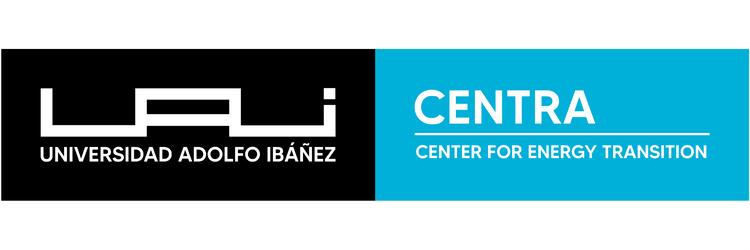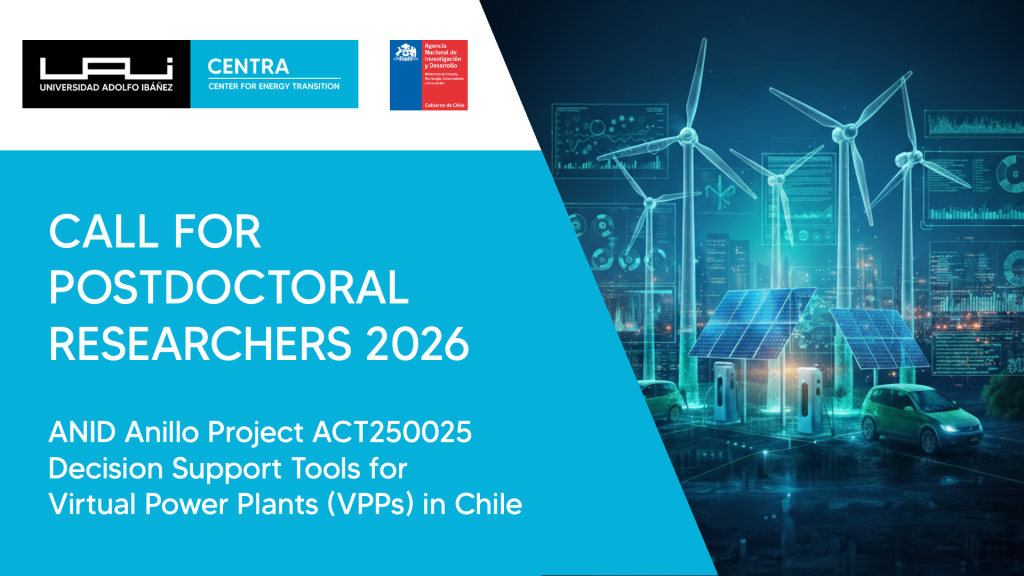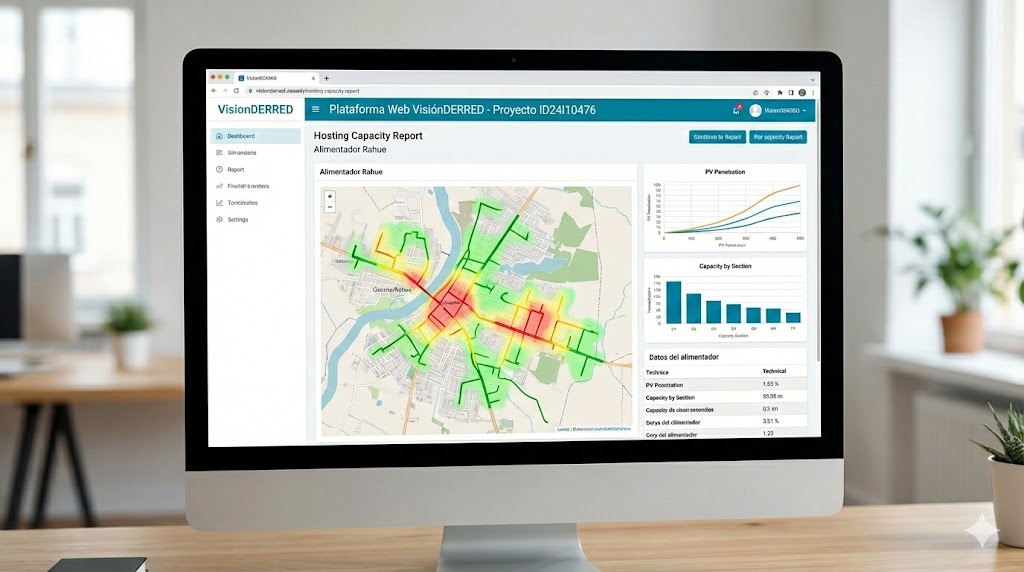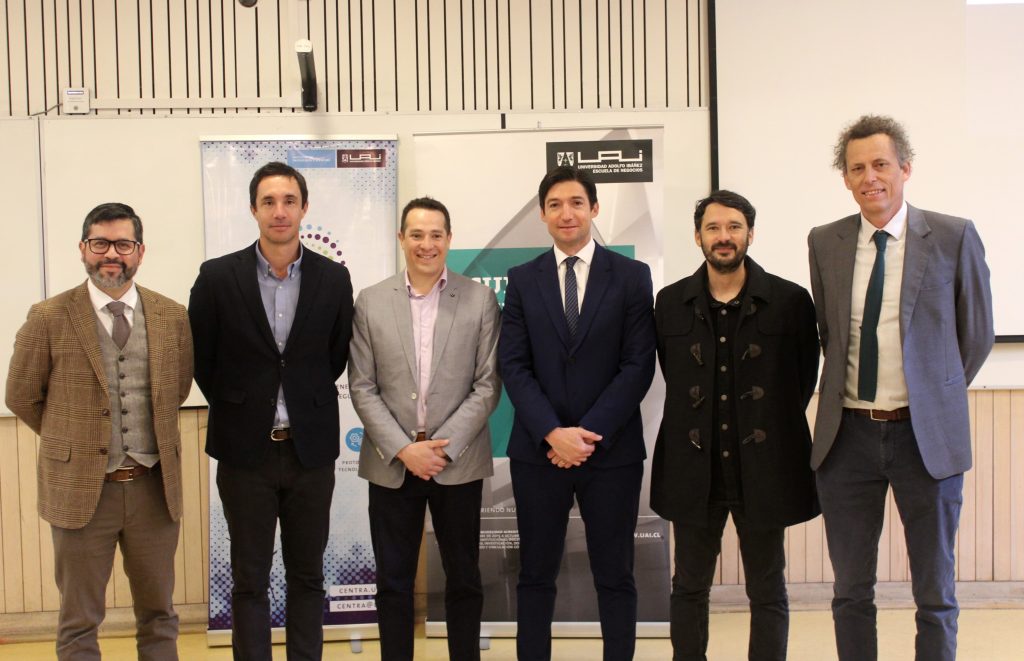Call for Applications: Postdoctoral Research Positions 2026
Call for Applications: Postdoctoral Research Positions 2026
The UAI Center for Energy Transition (CENTRA) is a multidisciplinary research hub driving innovation to support the global transition toward sustainable energy systems. CENTRA focuses on research and development in clean fuels, sustainable energy supply, Industry 4.0, and tailored energy solutions for both urban and rural communities. (https://centra.uai.cl) We are currently inviting applications for Postdoctoral Researcher positions to contribute to the high-impact Anillo Project ACT250025:…
VisiónDERRED web platform for efficient integration of distributed energy resources
Project Identification Official Title: Web platform for distribution network analysis for the efficient integration of distributed energy resources (ID24I10476). Project Type: FONDEF IDeA R&D Project. Executing Institution: Adolfo Ibáñez University (UAI) / Energy Transition Center (CENTRA). Execution Period: May 2024 – May 2026. Partner Entity: Chilean Solar Energy Association AG (ACESOL). Platform Link (Dev): https://app-dev.visionderred.cl/ Status: In execution. Executive Summary The VisiónDERRED project aims to…
Applied research topics in energy with CENTRA
june 3, 2025 On Monday, June 3rd, a presentation session was held at the Peñalolén Campus to showcase the applied research lines of the Center for Energy Transition at Universidad Adolfo Ibáñez (CENTRA). The event was addressed exclusively to UAI undergraduate (TID), master’s, and PhD students interested in joining ongoing projects or developing new proposals. The session highlighted CENTRA’s core research areas: energy transition policies…
Launch of the CENTRA-EDF Chile Research Chair
August 23, 2024 The research project will focus on exploring solutions for a more efficient and sustainable energy system, with an emphasis on energy storage. In a ceremony attended by leading academics, industrial leaders and government representatives, the Faculty of Engineering and Sciences and the Business School of Adolfo Ibáñez University (UAI), in collaboration with EDF Chile, launched a research project that will focus…
Integration of predictive and prescriptive approaches in stochastic optimization
The use of data science tools for decision making in organizations has grown significantly in recent years. The usual practice is to first use the data to create a forecast model for uncertain elements, such as demand, and then use this model as input in an optimization scheme that chooses the best course of action from a set of alternatives. The objective of this project…
Configurable Testbed for Low Carbon Power System Dynamics with High Penetration of Power Electronics.
The project consists of a real-time simulator distributed in 4 different geographical locations, which will be coordinated through the internet. The reason for considering distant geographic locations is to model the remote communication of distant elements through conventional communication channels. This interaction seeks to test the feasibility that the distribution infrastructure can respond to control commands given from the electrical system operator for various purposes….
Distributionally Robust Models for Multi-Stage Stochastic Optimization Problems
This research project aims to develop new models, theory, and algorithms for dynamic optimization model problems that incorporate robustness for the underlying probability distributions. We focus our work on the important classes of multistage stochastic problems, in which information is revealed period by period and decisions are made accordingly, using information from previous stages.
REMIND: Renewable Energies for Water Treatment and REuse in Mining Industries
The overall aim of REMIND is to develop an innovative framework of interplay between Renewable Energy Sources (RES) and innovative Water Treatment Technologies in the logic of a sustainable growth for mining industries. The novel paradigms explored are expected to drastically reduce the environmental impact due to extensive water and energy consumption, and to release of untreated wastewater during the production cycle of copper and…
Adapting to the uncertainties and risks of climate change: Advanced methods and models for energy systems and markets
The aim of the project is to develop new mathematical models and computational methods that help the private and public sector to adapt energy systems and markets to high uncertainties and risks derived from climate change. To achieve this goal, the research addresses three research objectives: (1) Model and classify the different types of uncertainties and risks associated with climate change; (2) Develop energy planning…
Solar Energy Research Center (SERC-Chile)
The overall aim of SERC Chile is to build a solid base of knowledge on solar energy. For this second stage (2017-2022), four strategic focuses were defined for the development of solar energy in Chile: 1) Massive integration of large-scale solar energy to the electric interconnected system, 2) Solar energy based mining in Chile, 3) Development and widespread adoption of small-scale solar solutions and 4)…










